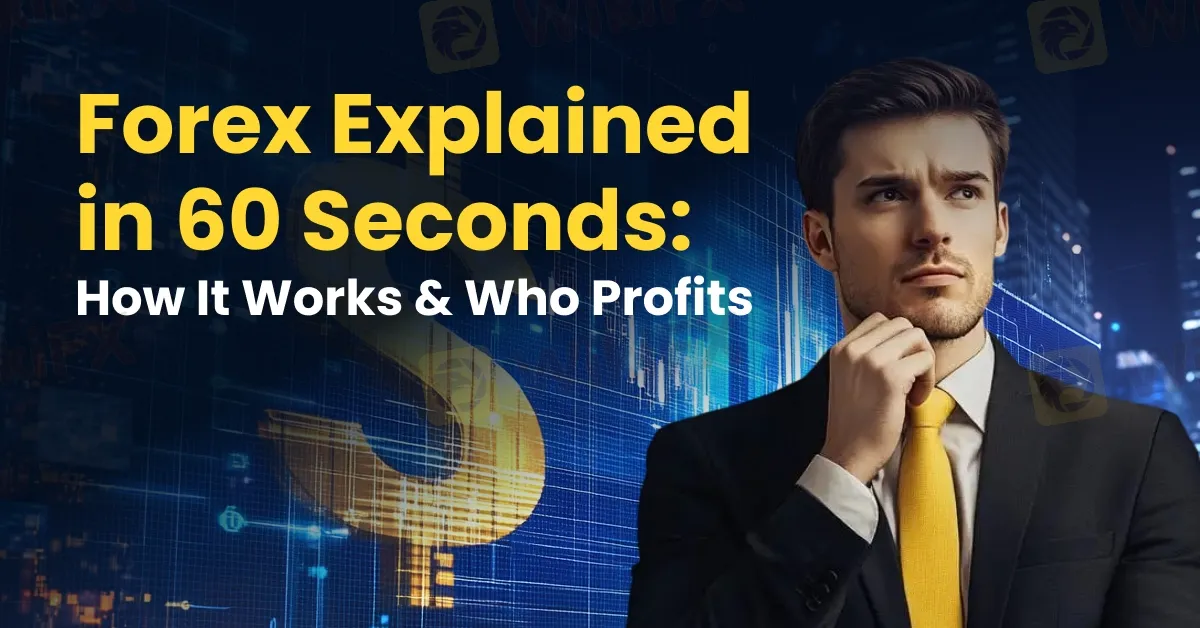简体中文
繁體中文
English
Pусский
日本語
ภาษาไทย
Tiếng Việt
Bahasa Indonesia
Español
हिन्दी
Filippiiniläinen
Français
Deutsch
Português
Türkçe
한국어
العربية
Forex Explained in 60 Seconds: How It Works & Who Profits
Abstract:Before diving into the forex market, it’s crucial to understand its mechanics, risks, and profit potential. Without a clear grasp of how forex operates, you risk losing money instead of making it. Here’s a concise breakdown to help you navigate this dynamic financial market.

Before diving into the forex market, it‘s crucial to understand its mechanics, risks, and profit potential. Many traders jump in, lured by stories of quick wealth, only to realise that success requires knowledge, strategy, and discipline. Without a clear grasp of how forex operates, you risk losing money instead of making it. Here’s a concise breakdown to help you navigate this dynamic financial market.

The foreign exchange (forex or FX) market is the largest financial market in the world, with a daily trading volume exceeding $7 trillion. Unlike stock markets that trade on centralised exchanges, forex operates over-the-counter (OTC), meaning currencies are traded electronically across global financial centres. Participants include banks, hedge funds, corporations, governments, and retail traders. Trading takes place 24 hours a day, five days a week, as major financial hubs in London, New York, Tokyo, and Sydney overlap.
Forex trading involves buying one currency while simultaneously selling another. Currencies are quoted in pairs (e.g., EUR/USD, GBP/JPY), where the first currency is the base, and the second is the quote. If a trader believes the base currency will strengthen against the quote currency, they buy the pair; if they expect it to weaken, they sell.
Trades are executed through brokers or trading platforms, often with leverage—a tool that allows traders to control larger positions with a fraction of the capital. However, leverage amplifies both potential gains and losses, making risk management essential.

Forex brokers make money in several ways. Most charge a spread—the difference between the bid (buy) and ask (sell) price. Some also charge commissions per trade or profit from traders' losses through a dealing desk model.
On the other hand, retail traders aim to profit from price fluctuations by speculating on market movements. Successful traders rely on technical analysis (charts and indicators), fundamental analysis (economic events and news), and risk management strategies. However, due to market volatility and high leverage, many retail traders lose money rather than turn a profit.

The forex market itself is not a scam. In fact, contrary to general beliefs, it is a legitimate financial marketplace. However, due to its decentralised nature, it has attracted scams in the form of fraudulent brokers, Ponzi schemes, and misleading ‘get-rich-quick’ trading courses. The key to staying safe is choosing a well-regulated broker (licensed by the FCA, CySEC, or another reputable authority) and avoiding unrealistic profit promises.
Forex trading offers vast opportunities, but it is not a shortcut to wealth. Education, strategy, and risk management are vital for success. Before risking real money, traders should practise on demo accounts and understand the markets complexities. With the right approach, forex can be a rewarding endeavour, but only for those who treat it with the respect and knowledge it demands.

Disclaimer:
The views in this article only represent the author's personal views, and do not constitute investment advice on this platform. This platform does not guarantee the accuracy, completeness and timeliness of the information in the article, and will not be liable for any loss caused by the use of or reliance on the information in the article.
Read more

"Rate & Reward: Broker Review Contest"
Share Your Real Experience, Rate Your Broker Duration: April 21, 2025 – May 23, 2025 Eligibility: Must be a verified account holder of the reviewed broker.

Why Are More Regulated Brokers Providing Free VPS Services?
Discover why more regulated brokers are offering free VPS services, enhancing trading efficiency, reducing costs, and improving client retention in the competitive trading market.

Southeast Asia’s Booming Investment Scams | How Smart Traders Stay Safe
The stories are all too familiar: “A slick website, aggressive marketing on social media, promises of guaranteed returns, and then radio silence when it’s time to withdraw.”

What Every Trader Must Know About Online Brokers
In the world of online trading, where fortunes can be made or lost in the blink of an eye, success often depends on more than market knowledge or strategy. It hinges, sometimes invisibly, on one crucial factor: your online trading broker. But what exactly is an online trading broker, and why is their role so pivotal to your financial journey?
WikiFX Broker
Latest News
Five UK Financial Firms Collapse, FSCS Offers Support for Affected Clients
Why Trade Agreements Matter to Nations
Non-Existent Online Scheme Took Away RM580,000
RM15 Million Gone in Fake Investment Scam
Crypto Traders Hit by Scam Using Fake Regulatory Documents, MFSA Cautions
Trade Fights Are Heating Up—What Happens Next?
Juno Markets Upgrades to FYNXT PAMM
Think Scams Won’t Happen to You? That’s Exactly What Scammers Count On
Beware of New Scam Tactics Lurking on WhatsApp!!
Italy’s CONSOB Blocks Sites of ITradingFX and NEX TRADE in Latest Crackdown
Currency Calculator


